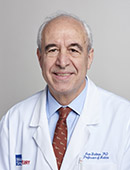
Juan J Badimon, PhD
About Me
Juan Jose Badimon, PhD, is Professor of Medicine and Director of the Atherothrombosis Research Unit at the Cardiovascular Institute, The Mount Sinai School of Medicine.
Dr. Badimon was born in Barcelona, Spain. In 1981 he earned the title of Pharmacologist from Spain’s National Research Council (CSIC) and in 1982 his PhD summa cum laude from the University of Barcelona. That same year Dr. Badimón moved to the United States where he completed a Post-Doctoral Fellowship at the Mayo Clinic in Minnesota until 1984. From 1984-1991 Dr. Badimon was an Assistant Professor of Medicine at The Mount Sinai School of Medicine and from 1991-1994 he was Assistant Professor of Medicine at Massachusetts General Hospital (Harvard University). In 1994 he returned to Mount Sinai School of Medicine in New York as Associate Professor of Medicine.
Dr. Badimon's research interests are focused on the pathogenesis and treatment of atherosclerosis, thrombosis, and cardiovascular diseases, and more specifically on the mechanisms involved in the genesis, progression and disruption of the vulnerable lesions responsible for the onset of acute coronary syndromes (i.e. myocardial infarction, stroke, etc.These studies have utilized imaging techniques (CTA, MRI) that allow for the non-invasive detection and characterization of atherosclerotic lesions. The Badimon lab was the first to document the benefits of high-intensity statin doses on human atherosclerotic lesions using MRI.
The Badimon lab has been instrumental in the study of novel therapeutic interventions directed toward the inhibition of the Tissue Factor (TF) pathway. The Badimon lab has published several articles with direct inhibitors of Factors II (thrombin) and Factor Xa of the coagulation cascade.
More recently, Dr. Badimon’s group is investigating the metabolic pathways involved in the adverse remodeling after ischemia/reperfusion. These studies are being undertaken both at the translational (porcine model) and clinical levels. The initial porcine studies were critical to demonstrate that the cardiovascular benefits of the SGLT2-inhibitrs, empagliflozin, were independent of its hypoglycemic activity. These studies were key for the design and performance of the EMPATROPISM trial (NCT 03485222). This mechanistic trial involving HFrEF patients without diabetes, showed that the SGLT2-inhibitors are an effective alternative for the treatment of HFrEF patients independently of their glycemic status.
Among the honors and awards received, Dr. Badimon has been named Doctor Honoris Causa by the Catholic University of Buenos Aires and the University of Cordoba, Argentina, is a member of the Royal Academy of Pharmacy of Spain and of the Catalan Royal Academy of Pharmacy, He is a Fellow of the American College of Cardiology (FACC) and the American Heart Association (FAHA)…)….Dr. Badimon is also a member of multiple international professional associations and Honorary Member of the Societies of Cardiology of Argentina, Chile, Columbia, Ecuador, Mexico, Peru, Spain, and Venezuela. Dr. Badimon also serves on the editorial boards and as a reviewer of many U.S. and international journals, including the Journal of the American College of Cardiology (Editor of the Pharmacology Section), Cardiovascular Drugs and Therapy (Associate Editor), the New England Journal of Medicine, Circulation, and the European Heart Journal, among others. Dr. Badimon has published more than 380 peer-reviewed articles in atherothrombosis, imaging and cardiovascular diseases in general.
Scientific mentorship has always been a priority of Dr. Badimon’s and over the course of his career he has trained more than 50 fellows from different countries. He has also directed 7 doctoral dissertations.
Language
English
Position
PROFESSOR | Medicine, Cardiology
Education
Licenciature in Pharmacy, University of Barcelona
PhD Summa Cum Laude, University of Barcelona
Specialty in Pharmacology, University of Barcelona and CSIC
Awards
2013
Simon Dack Award
The American College of Cardiology
2006
Recipient of the John Paul II Medal
Jagiellonian University of Krakow
2004
Researcher of the 2004 Year
The Royal Academic of Pharmacy of Spain
2003
Xth Joan D'Alos Award
1997
VII Intern Award
Association Thrombosis and Haemostasis
1989
Dr. Herman and Suzanne Denber Award for Cardiovascular Research
The Mount Sinai Medical Center
Publications
Selected Publications
- Targeting Triglycerides in Cardiovascular Disease Prevention: Evidence, Mechanisms, and Emerging Therapies. Usman Alam, Sheetal V. Mathai, Annalisa Filtz, Toshiki Kuno, Juan J. Badimon, Allan D. Sniderman, Salim S. Virani, Peter P. Toth, Michael D. Shapiro, Carl J. Lavie, Deepak L. Bhatt, Leandro Slipczuk. Current Cardiology Reports
- Erratum: Correction to: "Cardioprotective Effect of Empagliflozin and Circulating Ketone Bodies During Acute Myocardial Infarction" (Circulation. Cardiovascular imaging (2023) 16 4 DOI: 10.1161/CIRCIMAGING.123.015298.). Carlos G. Santos-Gallego, Juan Antonio Requena-Ibáñez, Belen Picatoste, Brian Fardman, Kiyotake Ishikawa, Renata Mazurek, Michael Pieper, Samantha Sartori, Jorge Rodriguez-Capitán, Valentin Fuster, Juan J. Badimon. Circulation: Cardiovascular Imaging
- Are Sodium-Glucose Cotransporter-2 Inhibitors the Cherry on Top of Cardio-Oncology Care?. Carlos A. Gongora, Lili Zhang, Juan Lopez Mattei, Enrique Ruiz-Mori, Gina Gonzalez-Robledo, Leandro Slipczuk, Joffre Lara, Jorge E. Cossio-Aranda, Juan Badimon. Cardiovascular Drugs and Therapy